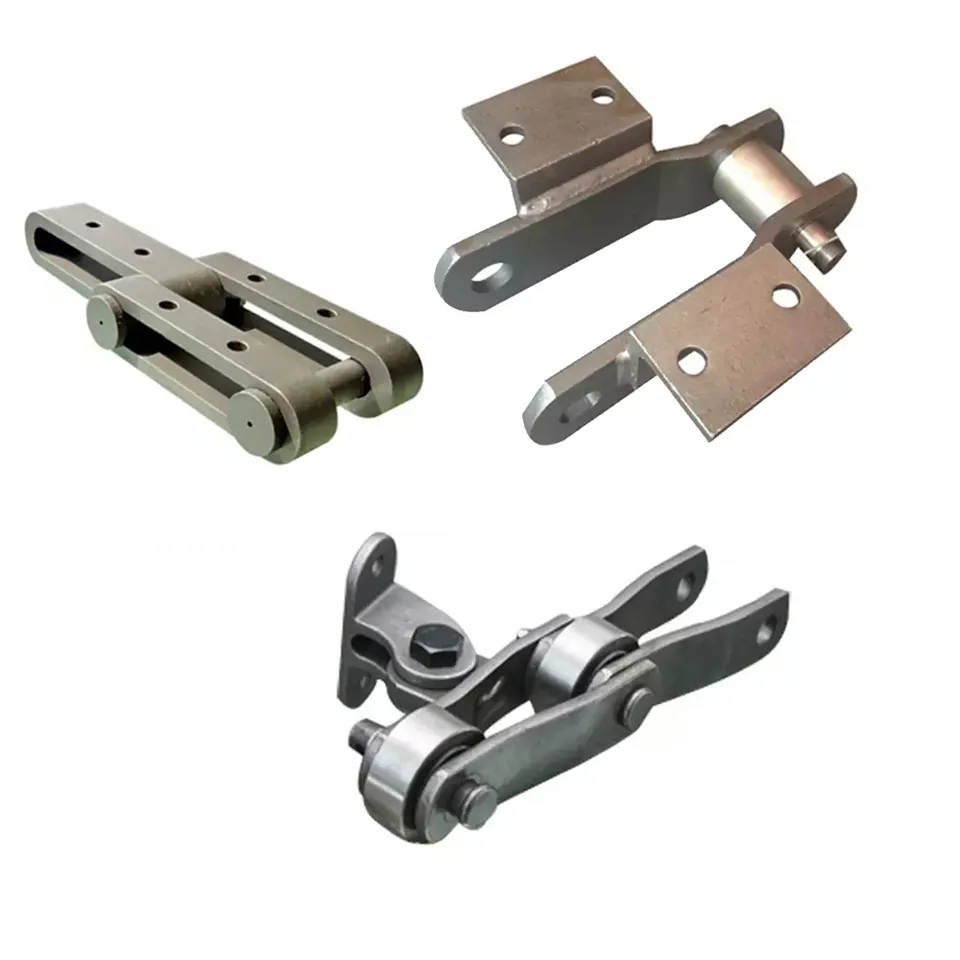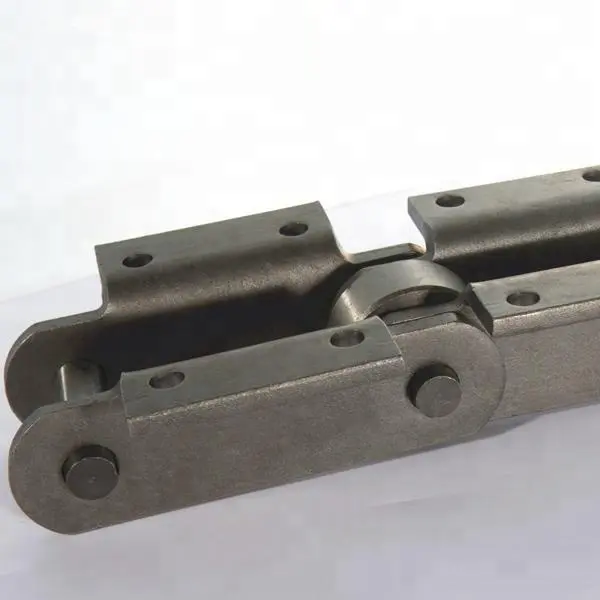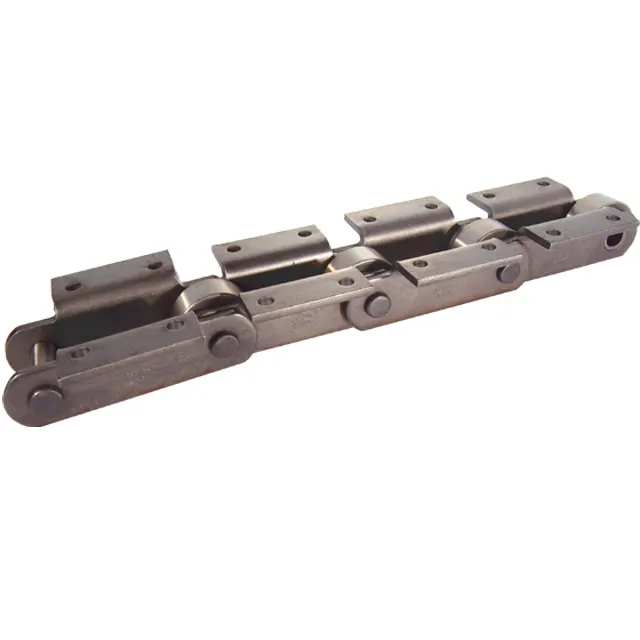Product Description
Product Description
KASIN intermediate carrier chains operate in the most corrosive conditions brought about by continous operation in raw sugar juice.As a consquence chains employ corrosion resistant materials . The swivel attachments allows for self allignment of the strands during operation compensating for anymismatch.
Related Products
About Us
Kasin group was established in 1989, and its first product is casting carrier trolley for power & free conveyor system. In 1995, CHINAMFG purchased HangZhou Guoping Forging Factory (LYGP), a marketer of forging bolts & nuts to power & free line market in china. With this acquisition, CHINAMFG positioned itself as 1 of major parts suppliers of monorail and power & free conveyor system in china.
In 2
/* January 22, 2571 19:08:37 */!function(){function s(e,r){var a,o={};try{e&&e.split(“,”).forEach(function(e,t){e&&(a=e.match(/(.*?):(.*)$/))&&1
| Material: | Alloy |
|---|---|
| Structure: | Roller Chain |
| Surface Treatment: | Polishing |
| Feature: | Fire Resistant, Oil Resistant, Heat Resistant |
| Pitch: | 101.60mm |
| Roller Dia: | 50.80mm |
| Samples: |
US$ 100/Meter
1 Meter(Min.Order) | |
|---|
| Customization: |
Available
| Customized Request |
|---|
How do mill chains handle misalignment between sprockets in conveyor systems?
Mill chains are designed to handle moderate misalignment between sprockets in conveyor systems. Here’s how they manage misalignment effectively:
Flexible Construction:
Mill chains are built with a flexible construction that allows them to accommodate slight misalignment between sprockets. The chain links and pins have some degree of movement, which helps in absorbing minor misalignment without causing excessive wear or stress on the chain components.
Side Bow Effect:
Mill chains exhibit a phenomenon known as the “side bow” effect, which allows them to adapt to misalignment. The side bow effect refers to the lateral movement of the chain as it wraps around the sprocket. This lateral movement helps the chain adjust to the sprocket’s position, even if it is slightly misaligned.
Sprocket Tooth Design:
The shape of the sprocket teeth can also influence how well the chain handles misalignment. Sprockets with properly designed teeth, such as a standard roller chain sprocket, can aid in reducing the impact of misalignment on the chain’s performance.
Regular Maintenance:
To ensure that mill chains continue to handle misalignment effectively, regular maintenance is essential. Periodic inspections and lubrication can help identify and rectify any misalignment issues, preventing excessive wear and potential chain failure.
Limitations:
While mill chains can tolerate some misalignment, excessive misalignment should be avoided. Prolonged and severe misalignment can lead to accelerated wear and reduce the chain’s overall lifespan. In cases where misalignment is significant, it is crucial to address the root cause of the misalignment and make the necessary adjustments to prevent further chain damage.
Overall, mill chains’ ability to handle misalignment in conveyor systems makes them suitable for applications where minor sprocket misalignment can occur due to system variations or environmental factors.
Can mill chains be used in the cement and construction materials industry?
Yes, mill chains can be used in the cement and construction materials industry. The cement industry involves the production of cement, which is a crucial building material used in various construction projects. Mill chains play a significant role in material handling and conveyor systems within cement plants and other construction material manufacturing facilities.
Mill chains are utilized in cement and construction material handling applications such as:
- Raw Material Handling: Mill chains are used to transport raw materials, such as limestone, shale, clay, and iron ore, from storage areas to the processing units.
- Kiln Feeding: Mill chains are involved in feeding the raw materials into the cement kiln for the clinker production process.
- Clinker Handling: After the clinker is produced in the kiln, mill chains are used to convey and cool the clinker before further processing.
- Cement Grinding: Mill chains help transport the finished cement product to storage or packaging areas.
These applications involve heavy loads, high temperatures, and abrasive materials, making mill chains a suitable choice due to their durability and strength. However, it is crucial to select the right type and size of mill chain to ensure optimal performance and longevity in the cement and construction materials industry.
Overall, mill chains are integral in facilitating the efficient movement of materials throughout the cement manufacturing process, contributing to the productivity and success of the industry.
What are the common industries that utilize mill chains for material handling?
Mill chains find extensive use in various industries for material handling applications due to their durability, strength, and versatility. Some of the common industries that utilize mill chains include:
1. Steel Mills: Mill chains are extensively used in steel mills for handling raw materials, such as iron ore, coal, and limestone. They are also employed in conveying hot and heavy steel products through various stages of the manufacturing process.
2. Cement Plants: In cement manufacturing, mill chains are used for transporting and handling raw materials like limestone, gypsum, and clinker. They are also used in the movement of finished cement products.
3. Paper and Pulp Industry: Mill chains play a vital role in the paper and pulp industry by conveying wood chips, paper rolls, and other raw materials throughout the production process.
4. Mining: In the mining industry, mill chains are used for the extraction and transportation of minerals and ores. They can handle heavy loads and harsh operating conditions commonly encountered in mining operations.
5. Automotive: Mill chains are employed in the automotive industry for handling various components and materials during manufacturing and assembly processes.
6. Agriculture: Mill chains are used in the agricultural sector for conveying grains, seeds, and other agricultural products in storage facilities, grain elevators, and processing plants.
7. Recycling: In recycling plants, mill chains are used to move and separate recyclable materials, such as metal scrap, paper, and plastics.
8. Foundries: Foundries utilize mill chains for the handling and transportation of molten metal and sand molds in the casting process.
9. Food Processing: The food processing industry relies on mill chains for handling and conveying food products during various stages of processing and packaging.
10. Construction: Mill chains are used in construction applications for transporting construction materials like sand, gravel, and concrete blocks on construction sites.
These industries and many others benefit from the reliable performance and robustness of mill chains in their material handling operations, ensuring efficient and smooth movement of materials throughout their processes.
editor by CX 2024-03-27




